- Stat Significant
- Posts
- Quantifying 'The Kevin Bacon Game': A Statistical Exploration of Hollywood’s Most Connected Actors
Quantifying 'The Kevin Bacon Game': A Statistical Exploration of Hollywood’s Most Connected Actors
Examining 'Six Degrees of Kevin Bacon' and its statistical underpinnings.
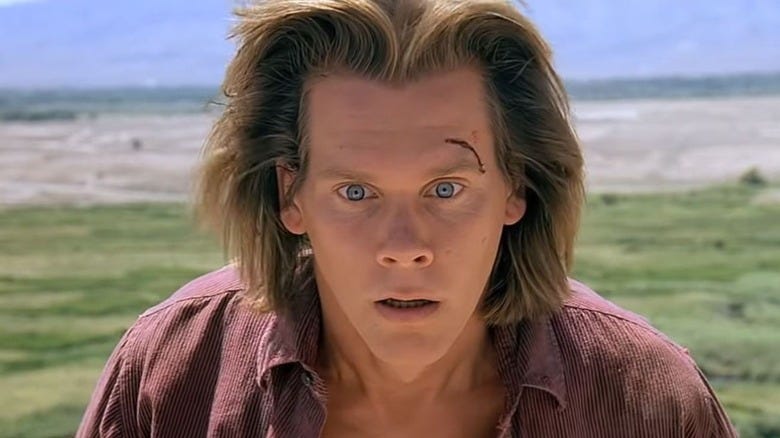
Tremors (1990). Credit: Universal Pictures.
Intro: Kevin Bacon, Nucleus of Hollywood
How did Kevin Bacon become a folk hero for movie nerds? Well, the strange saga of Bacon's cult status begins with an innocuous quote in an unremarkable magazine article.
In a Premiere interview from January 1994, Kevin Bacon mentioned that he had "worked with everybody in Hollywood or someone who's worked with them." Unbeknownst to Bacon (and the world!), this one throwaway comment would change the course of his life.
In response to the Premiere interview, a thread emerged on an early internet message board entitled "Kevin Bacon is the Center of the Universe," with commenters debating the actor's centrality within the film industry. That same year, three Bacon-curious college students invented "The Kevin Bacon Game," capitalizing on the growing wave of internet curiosity (and after watching two Kevin Bacon movies back-to-back).
For those unfamiliar: "The Kevin Bacon Game," also known as "Six Degrees of Kevin Bacon," challenges players to connect any actor to Kevin Bacon through a chain of no more than six movies based on co-starring roles. A prototypical answer to the game typically goes something like this:
Carrie Fisher was in Star Wars with Harrison Ford
Harrison Ford was in The Fugitive with Tommy Lee Jones
Tommy Lee Jones was in JFK with Kevin Bacon
Ipso facto, Carrie Fisher is three degrees removed from Kevin Bacon.
Word of the parlor game spread, and soon, the game's creators began proselytizing their creation on "The Jon Stewart Show" and "Howard Stern." In a very short period, Bacon's alleged Hollywood centrality had metastasized from internet rumor to physical media, as a "Six Degrees of Kevin Bacon" book was released in addition to a board game based around the concept.
Initially, Kevin Bacon disliked the game, believing it was ridiculing him and his career, but over time, the affable star embraced the concept and even founded a charitable organization called Sixdegrees.org. In 2023, Bacon started a podcast called "Six Degrees with Kevin Bacon," dedicated to highlighting charitable causes—the culmination of a wild chain of events that began with a throwaway quote from a relatively banal magazine interview.
As an avid player of the Kevin Bacon Game, I've always been curious about its statistical merits. Is Bacon the film industry's most connected actor, or is the game's popularity a triumph of branding (in that they picked the right person)?
So today, we'll examine the statistical underpinnings of the Kevin Bacon game, digging into three key facets of game lore:
That Kevin Bacon is a central figure within an extended universe of Hollywood actors.
That Kevin Bacon has appeared in numerous ensemble casts that readily connect him to other actors.
That Kevin Bacon's folk hero status stems from being a well-known supporting actor as opposed to a consistent leading man.
Who Are the Most Connected Actors in Hollywood?
Graph theory is the study of complex networks, focusing on systems comprised of interconnected nodes (representing people or institutions) and edges (representing the relationship between two nodes). This form of statistical modeling is frequently used to analyze communities, like showing Facebook connections and how various clusters form around location, spiritual belief, or socioeconomic factors.
This modeling technique also broadly applies to the film industry, where we can create networks using actors as nodes and movies as edges. Consider the following example graph with Jack Nicholson, Adam Sandler, and Leonardo DiCaprio:
Nicholson and Sandler were in Anger Management together.
DiCaprio and Nicholson were both in The Departed.
The resulting graph looks something like this:
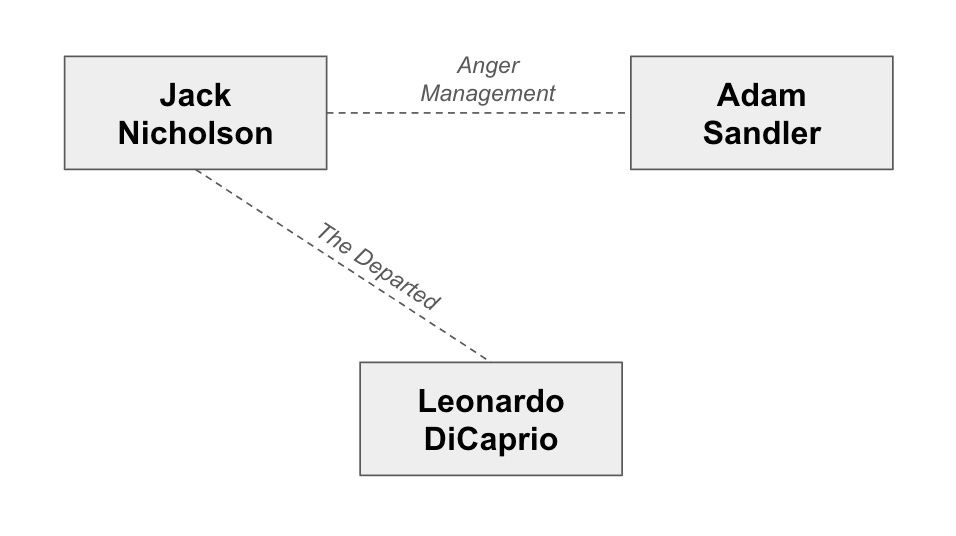
We can build a network featuring every actor in Hollywood and then calculate which figures are most central to the film industry's casting graph. Below is an example network of the 50 most connected actors in entertainment (to use more than 50 examples would render the visual unreadable). The actors (nodes) that are largest and most central, like Morgan Freeman and Bruce Willis, are ideal fodder for the Kevin Bacon game—a cheat code for connecting disparate careers via extensive movie credits.
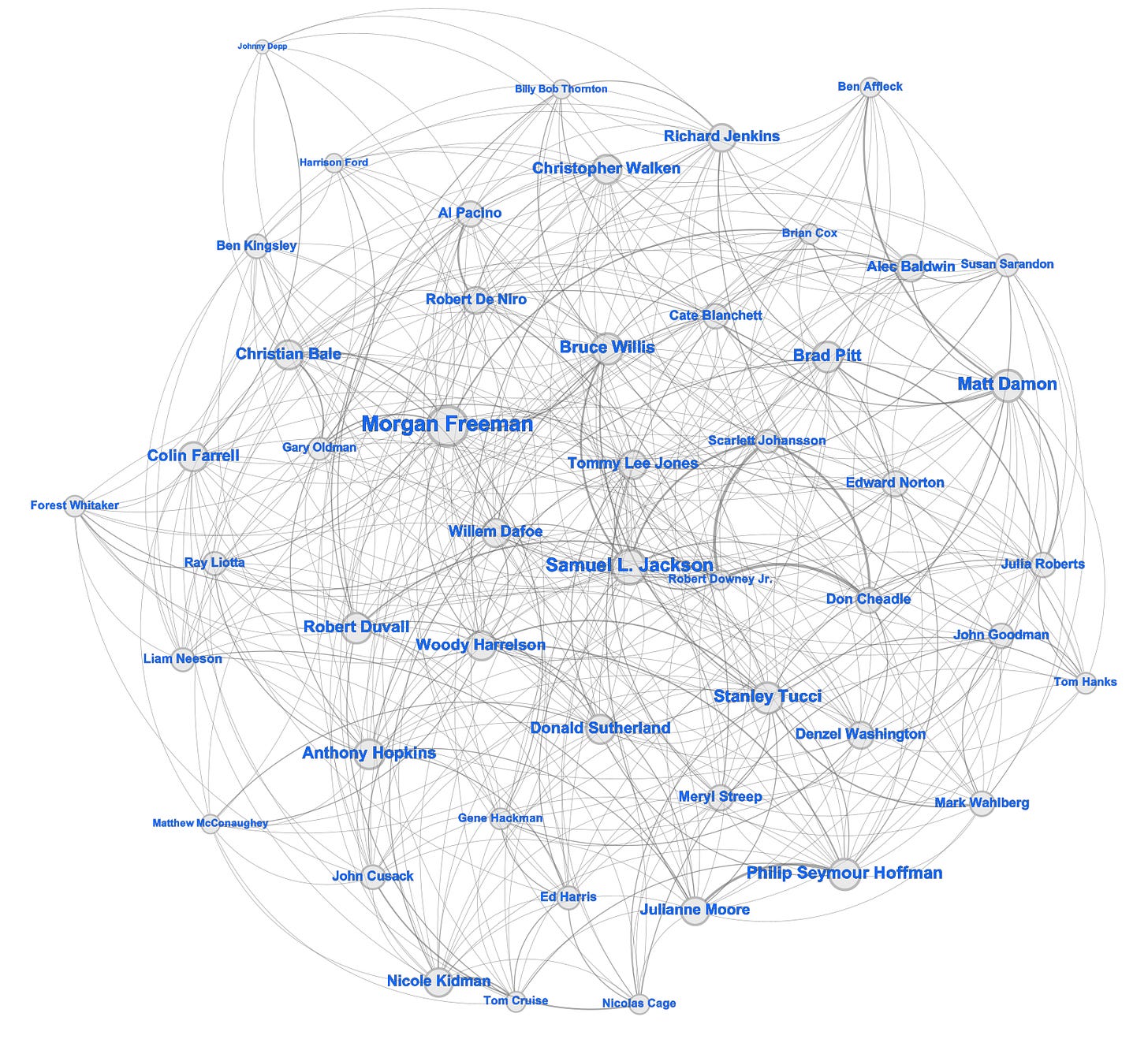
An example network of actors connected by co-starring film credits.
We'll use "eigenvector centrality" to measure an actor's network importance, which considers both direct connections and the influence of second and third-order connections. A higher score means an actor is more central to our casting network.
When we calculate our centrality metric for every actor in the film industry, our top scorers are prolific performers who have appeared in numerous ensemble projects (which is not surprising at all).
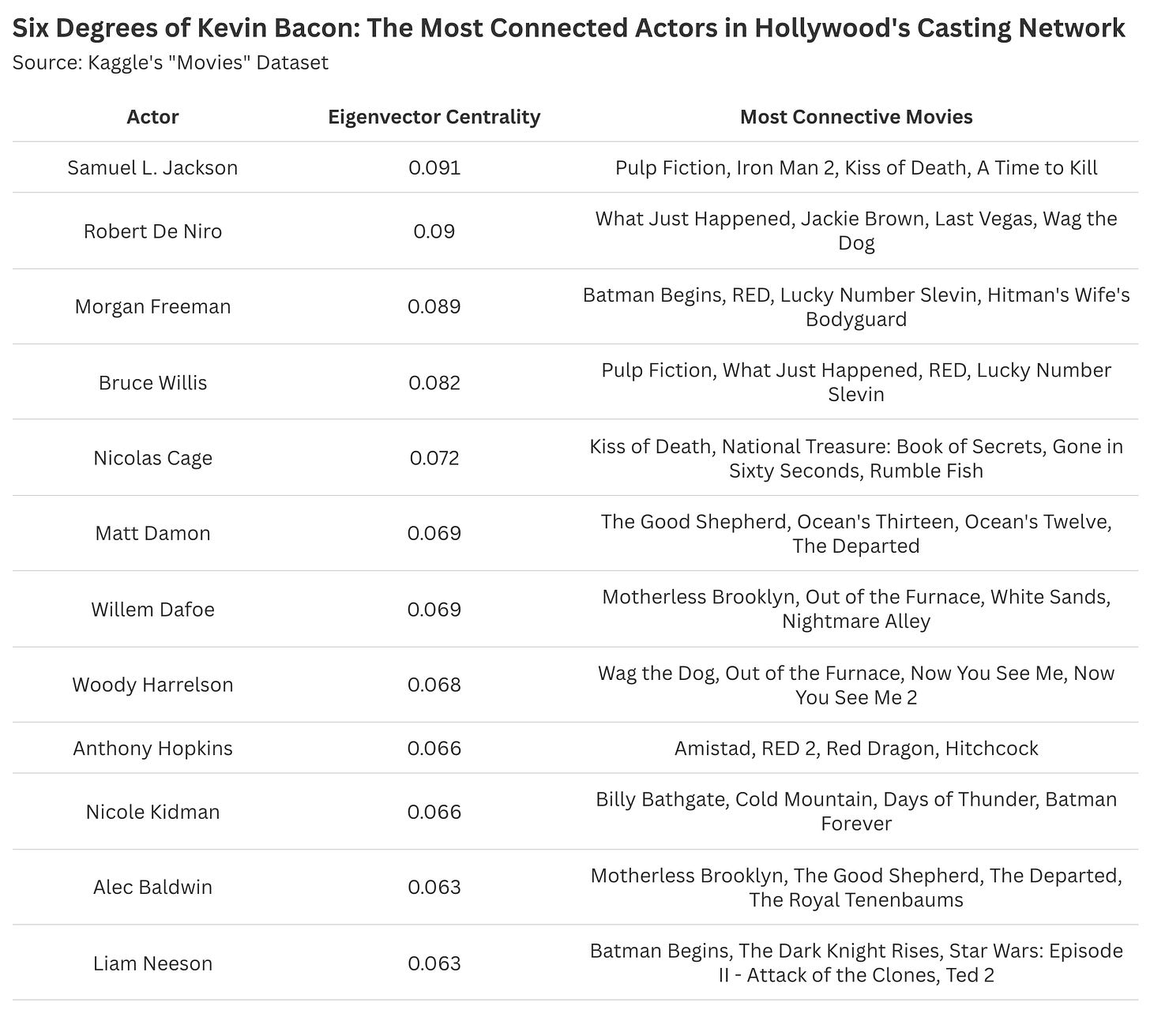
Some Observations:
Samuel L. Jackson!: There's always a brief moment of anxiety after compiling my data but right before I execute my code—I'm always nervous that the output of my analyses won't make sense. Needless to say, I was pretty relieved when Samuel L. Jackon topped this list. Jackson must really love being in movies, really love money, or both. He's appeared in Pulp Fiction, nearly every Marvel movie, Star Wars, Capital One commercials, numerous Quentin Tarantino ensembles, and so much more. My first instinct was to propose changing the Kevin Bacon Game to "Six Degrees of Samuel L. Jackson," but upon further reflection, using Jackson as a focal point may not be fun—he's simply too connected to every other performer.
This List is Mostly Dudes: Every time I write an article centered around list-making, I get male-dominated results. In this case, lack of female representation is the product of two industry trends:
Fewer Roles for Actresses After Middle Age: Arguably, the most crucial input to our centrality calculation is the number of roles an actor has had throughout their career. As I've examined in a previous piece on gender representation, opportunities for older female actors are limited, at least historically speaking. Over time, on-screen gender representation has improved, so there's a chance this list would feature Jennifer Lawrence or Zoe Saldana twenty years from now. By the grace of God, AMC Theaters mascot Nicole Kidman proved the lone exception within this group.
Action Ensembles: Many films featuring our highly-networked actors are action movies with large male casts. In a later section, we'll explore this project archetype in more detail, in case you're jonesing for well-crafted data journalism on The Expendables or The Hitman's Bodyguard (two imminently forgettable movies that are somehow part of multi-film franchises).
No Kevin Bacon?!?: Kevin Bacon is #64 in our extended rankings—he is central but not the most central. There is an argument that this is the right amount of connectedness for optimal Bacon gameplay. Picking the game's titular figure comes with a Goldilocks problem: you want someone well-connected but not too well-connected so as to allow for some strategy. Or at least that's how I'm choosing to interpret this data point.
What Are the Film Industry's Most Connective Movies?
If you've played Six Degrees of Kevin Bacon, you'll know that gameplay often centers on the actor's credits in star-studded casts like JFK, A Few Good Men, Apollo 13, Sleepers, and Crazy Stupid Love. The actor is a) in many films, and b) these films often link Bacon to a wide network of highly connected performers—or so Bacon lore would have you believe.
To quantify Hollywood's most connective movies, we'll invert the edge-node relationship so that shared actors now connect movies. For example, Mamma Mia! and Sophie's Choice could be connected via Meryl Streep (and would make for an awkward double feature).
When we run this calculation, we find that, once again, our top 12 list is absent a Kevin Bacon credit and is, instead, laden with action ensembles starring Samuel L. Jackson and Bruce Willis.
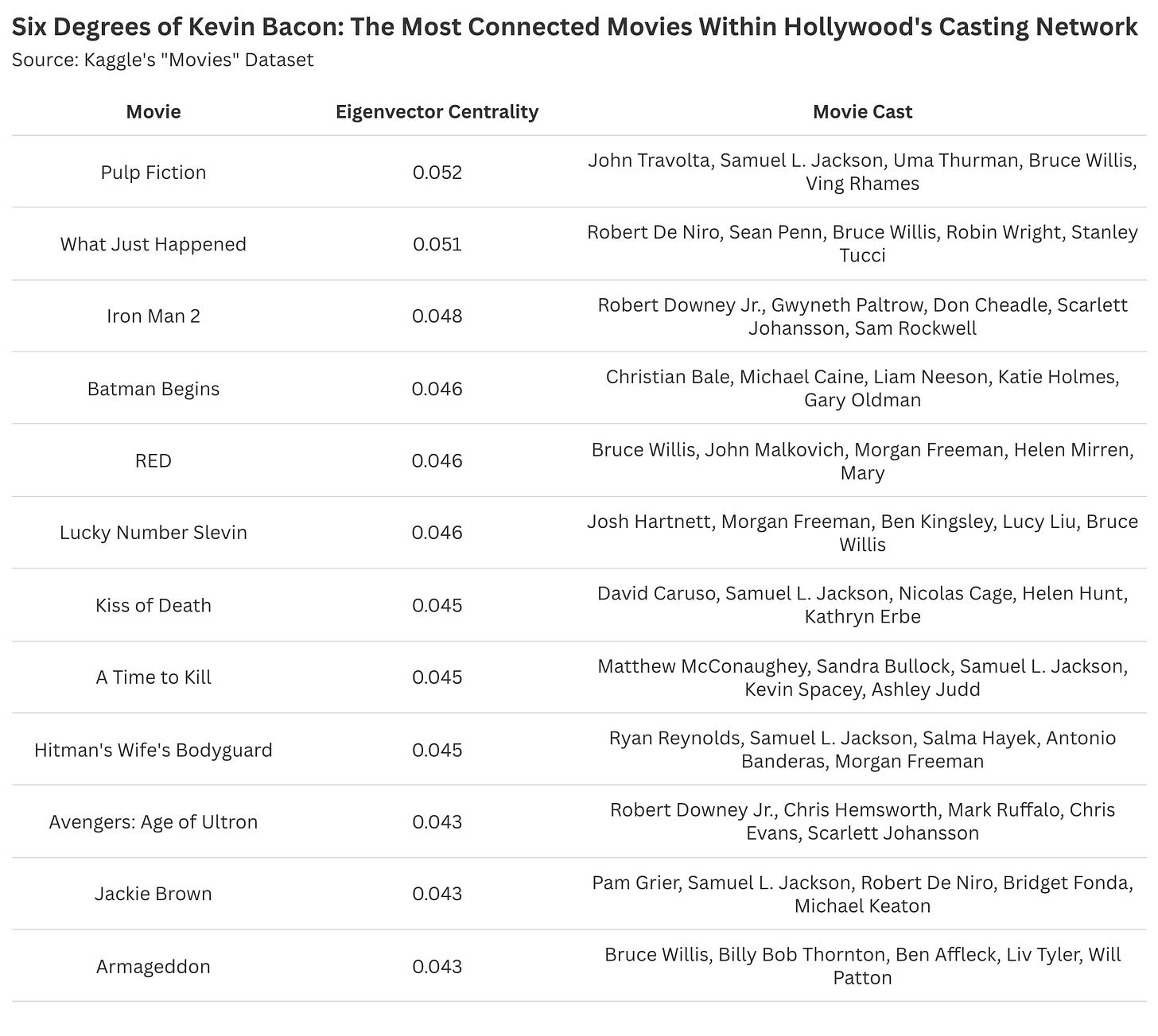
Some Observations:
Action Ensembles (Part Two): Movies like Red, The Hitman's Wife's Bodyguard, and Lucky Number Slevin employ casts of highly recognizable actors who are slightly past their prime (but still bankable!), such as Bruce Willis and Samuel L. Jackson. It's almost as if Willis and Jackson seek out large ensembles—a career strategy that sets off a reinforcing loop of ever-growing network connections: the films become more central to our network for having cast Willis and Jackson while the actors become more connected by having been in these movies.
Casting Maximalism: Sometimes, movies throw money at the screen in the form of name-brand actors, like in the case of Red or What Just Happened. No series embodies this shameless casting gimmick more than The Expendables, which just missed the cut for our top 12 list. The original elevator pitch for this series likely went something like this:
Person A: "Wouldn't it be cool if Stallone and Schwarzenegger and Wesley Snipes and Harrison Ford and Dolph Lundgren and Jason Statham were in the same movie?!"
Person B: "So cool! What's the story going to be about?"
Person A: ...[silence]...
Person B: "Sounds good, here's $100M!"
[Fin: end of elevator pitch]
No Kevin Bacon Again?!: Maybe the Kevin Bacon game is a lie—an act of skilled grassroots marketing. Perhaps we like Kevin Bacon more than we care about degrees of separation.
Who Are the Most Connected Supporting Actors in Hollywood?
At the heart of the Kevin Bacon Game's mythology lies the populist appeal of its namesake. Something just feels right about Bacon being the focal point, but what? I imagine Kevin Bacon struggled with this question when first hearing of the game.
Ultimately, I think Bacon's cult status rests on him being a highly identifiable supporting actor (who has led some movies). Kevin Bacon is one of the most well-known "that guy" performers—showing up in a film like JFK or Crazy Stupid Love, stealing a few scenes, and subsequently disappearing.
Indeed, when we filter our list for highly connected actors who are, on average, billed as a movie's fourth lead or lower, Bacon (finally!) makes the cut. What a relief.
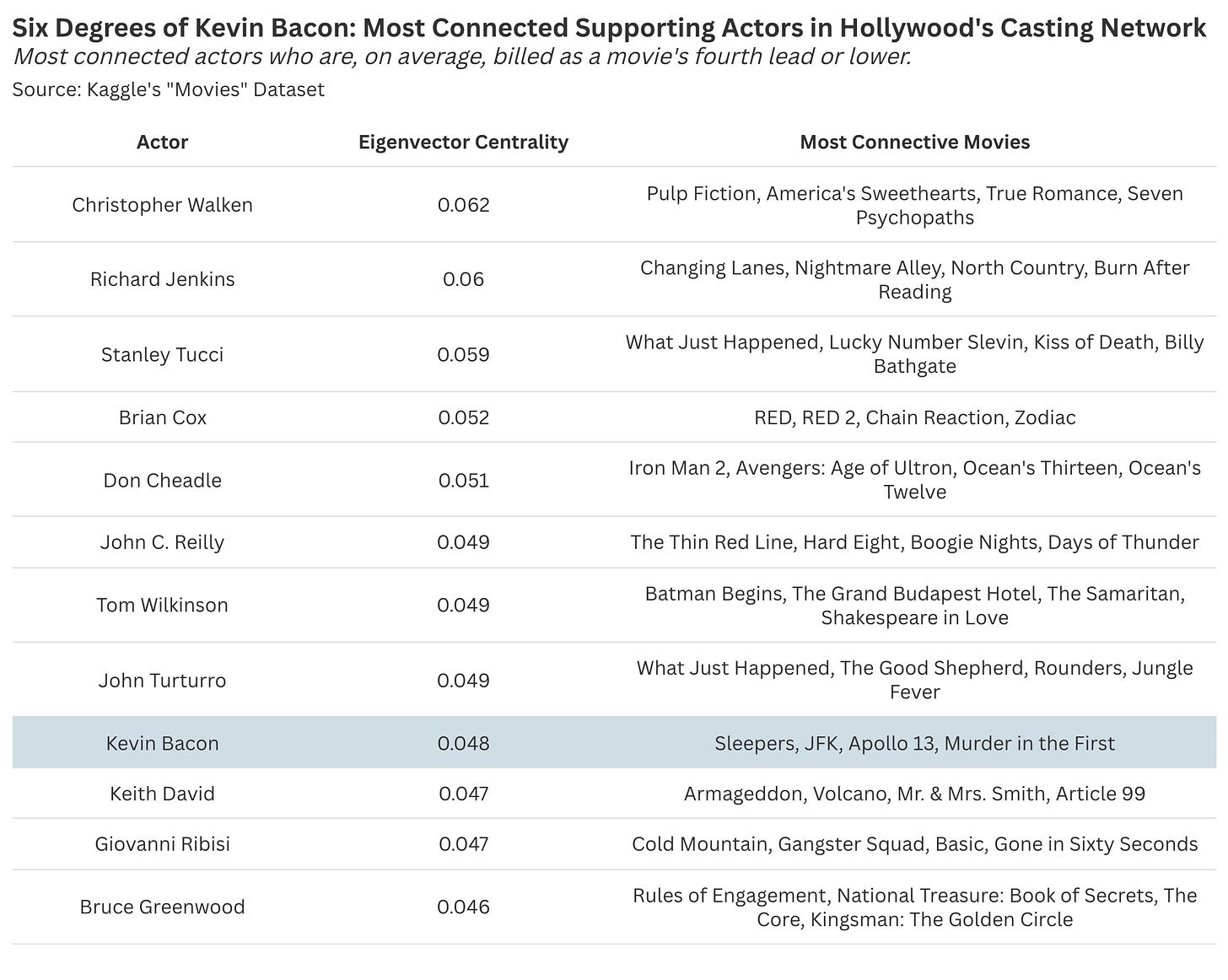
Some Observations:
Christopher Walken: I couldn't have asked for a better character actor to top this list. Walken has built a career around memorable supporting performances in films like The Deer Hunter, Wedding Crashers, Pulp Fiction, and Annie Hall. Walken has become so singular a figure (such a meme of himself) that he instantly imbues a character with gravitas. Sometimes, his casting fits with a project; other times, Walken feels out of place. Consider Dune Part 2, where he plays an imperial space emperor while sporting his trademark New York accent. I don't think this is what Dune author Frank Herbert pictured when he wrote the character, but who cares. We love Walken.
This List is All Dudes (Again): Perhaps I should stop using my data science skills to make lists of pop culture figures. Maybe I should dedicate my talents to accelerating misinformation at Facebook, finding new drilling sites for Exxon, or shorting stocks for a hedge fund. Jeff Hamerbacher, former head of data at Facebook, once said, "The best minds of my generation are thinking about how to make people click ads. That sucks." Apparently, I have accomplished something similar by continuously making lists laden with dude actors.
Is Kevin Bacon the Perfect Choice for a Six Degrees of Separation Game?: Would the Kevin Bacon game be as fun if another actor took his place? The Tom Cruise Game? The George Clooney Game? The Meryl Streep Game? Through pure serendipity, the Bacon Game creators stumbled upon the perfect subject:
Someone well-known but not too well-known
Someone highly connected but not too highly connected.
Final Thoughts: A Fun Little Brain Teaser
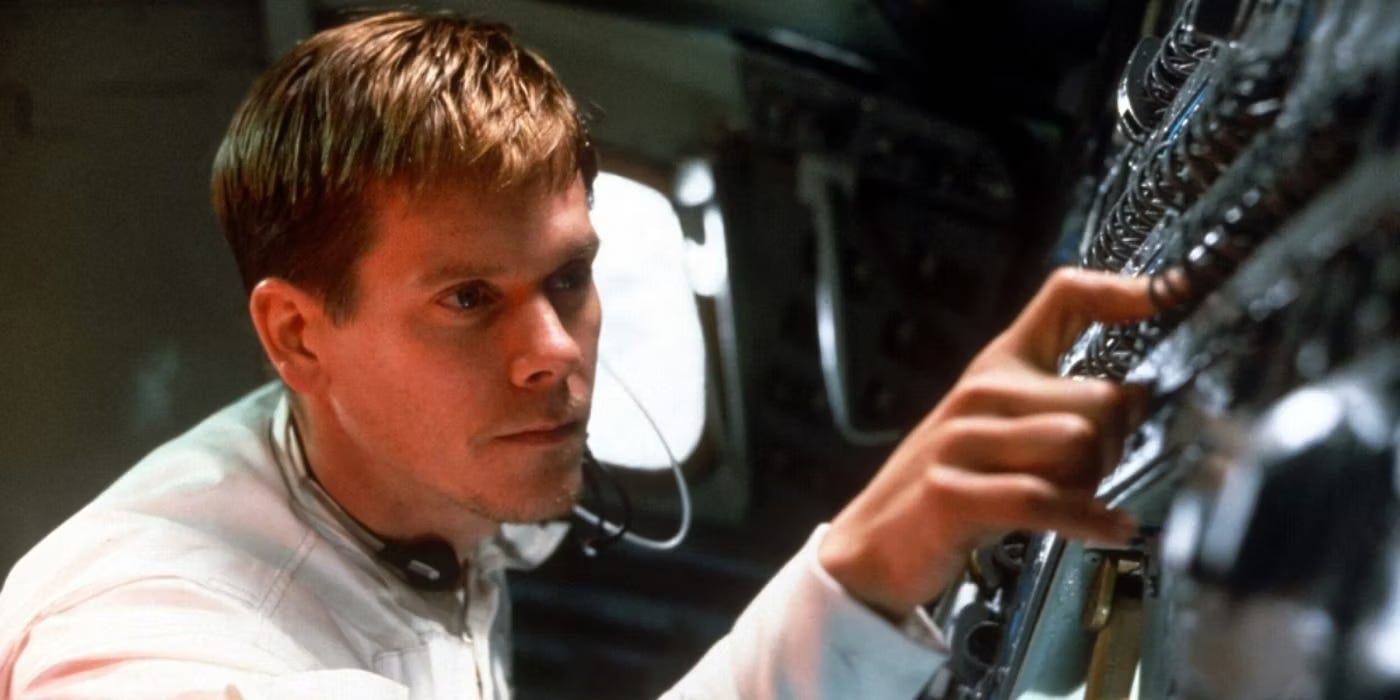
Apollo 13 (1995). Credit: Universal Pictures.
Growing up, I regularly attended an after-school film program where the last twenty minutes were reserved for playing the Kevin Bacon Game. I fondly remember these Bacon sessions—a sharp contrast to my complicated lifelong relationship with other movie nerds.
Despite loving movies, I've never fully connected with other film lovers (sans Bacon game). I often find conversations with cinephiles to be rife with pretension and self-importance, and if I'm being honest, I'm probably stricken with a modicum of self-loathing (after all, I do write a pop culture newsletter). Sometimes, I'll tell my wife about a pretentious conversation overheard at a movie theater (like film nerds trying to redeem Megalopolis, insufferably so), and she'll promptly remind me that I am a film nerd (I just haven't seen Megalopolis yet).
I feel a similar ambivalence when it comes to movie reviews and film theory. Many critics strike me as repetitive and self-aggrandizing—that their criticism centers on communicating the same ideas in the most highfalutin manner possible. In this context, a movie review exists to express one's ego instead of celebrating popular culture.
Okay, now back to Kevin Bacon: What I like about the Kevin Bacon Game is its facilitation of movie discourse devoid of pretension. Six Degrees of Kevin Bacon is sport, for sport's sake, an enablement function for talking about great movies like JFK, Mystic River, Footloose, and Sleepers—and that's it.
Usually, I try to assign greater meaning to an analysis by connecting my findings to a macro trend in the entertainment industry—I want my facts and figures to "mean something" (whatever that may be). The Kevin Bacon Game, on the other hand, is a welcome departure from this grand-scale thinking—it's just a silly little trivia game where film geeks can speak in a lexicon of movie references. There is no feasible way to tie Kevin Bacon to an all-consuming theory of cultural stagnation or the death of Hollywood, and that's the point. It's just a fun little brain teaser.
Like Bacon himself, there is a populist appeal to Six Degrees of Kevin Bacon, a game made accessible and appealing through its titular figure. Bacon may not be the center of the entertainment universe, statistically speaking, but he's the perfect person for the perfect movie game.
Struggling With a Data Problem? Stat Significant Can Help!

Having trouble extracting insights from your data? Need assistance on a data or research project? Well, you’re in luck because Stat Significant offers data consulting services and can help with:
Insights: Unlock actionable insights from your data with customized analyses that drive strategic growth and help you make informed decisions.
Dashboard-Building: Transform your data into clear, compelling dashboards that deliver real-time insights.
Data Architecture: Make your existing data usable through extraction, cleaning, transformation, and the creation of data pipelines.
Want to chat? Drop me an email at [email protected], connect with me on LinkedIn, reply to this email, or book a free data consultation at the link below.